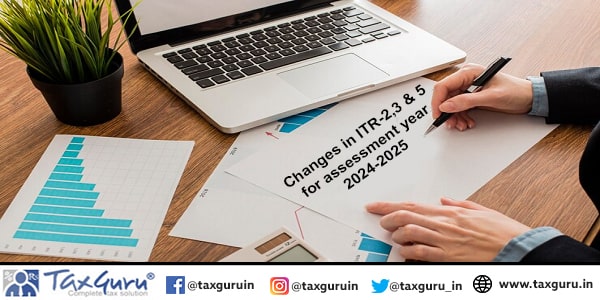Introduction: The Central Board of Direct Taxes (CBDT) has rolled out updated Income-tax Return (ITR) Forms 2, 3, and 5 for the Assessment Year (AY) 2024-25, marking a significant shift in tax filing requirements. These updates come as a response to the Finance Act 2023, aiming to refine the reporting framework, align with regulatory advancements, and simplify the tax compliance journey for taxpayers. From the introduction of Electronic Verification Code (EVC) verification for audited accounts to the detailed disclosure of transactions and payments, the modifications in these ITR forms are designed to foster transparency, enhance compliance, and cater to the evolving needs of the financial landscape.
1. Verification Through EVC for Audited Individuals/HUFs: Individuals and HUFs liable for audit under Section 44AB can now verify their ITR using an Electronic Verification Code (EVC), a shift from the earlier mandate of digital signature verification.
2. Due Date for Filing of Return: A new column in ITR 3 and 5 requires taxpayers to mention their applicable due date for filing returns, enhancing clarity on filing timelines.
3. Default Tax Regime Change: With amendments in Section 115BAC, the new tax regime is now default, and taxpayers wishing to opt for the old regime must explicitly choose to do so.
4. Legal Entity Identifier (LEI) Details: For transactions of INR 50 crores and above, details of the LEI number are now required, aligning with RBI regulations for high-value transactions.
5. Reason for Tax Audit under Section 44AB: Additional details regarding the circumstances necessitating tax audit are to be furnished in ITR 3 and 5.
6. Audit Report Acknowledgement and UDIN: Disclosure of the audit report acknowledgment number and UDIN is now mandatory for audits under Section 44AB.
7. “Receipts in Cash” Column for Presumptive Taxation Scheme: To claim the enhanced turnover limit under Section 44AD, details of cash receipts are required, reflecting amendments in the Finance Act, 2023.
8. Disclosure for MSME Payments: New columns under Part A-OI require disclosure of sums payable to MSMEs beyond prescribed timelines.

9. Capital Gains Accounts Scheme Details: Enhanced details regarding sums deposited under the CGAS are now required in Schedule-CG.
10. Winnings from Online Games: Schedule OS has been amended to include income from online games taxable under Section 115BBJ.
11. Contributions to Political Parties (Schedule 80GGC): New details regarding contributions to political parties are mandated for better transparency.
12. ESOP Tax Deferral: Schedule for tax deferred on ESOPs now seeks additional details like PAN and DPIIT Registration Number of the employer (eligible startup).
13. Deduction under Section 80CCH for Agnipath Scheme: A new column to claim deduction for contributions to the Agniveer Corpus Fund.
14. Deduction for Persons with Disability (Schedule 80U): New details required for claiming deductions under Section 80U.
15. Maintenance & Medical Treatment for Disability (Schedule 80DD): Enhanced details for deductions related to disability are now required.
16. Dividend Income from IFSC Units: Reporting of dividend income derived from units in IFSC at a reduced tax rate.
17. Bonus Payments from Life Insurance Policies: Schedule OS includes a new column for declaring bonus payments received under life insurance policies.
18. Income from Business Trusts: Reporting requirements for sums received from business trusts have been revised.
19. Comprehensive Bank Account Reporting: Mandatory disclosure of all bank accounts held by the taxpayer at any time, barring dormant accounts.
20. Adjustment of Unabsorbed Depreciation: New provisions for adjusting unabsorbed depreciation related to additional depreciation.
21. Deductions for Eligible Startups (Schedule 80-IAC): New details for startups claiming deductions under Section 80-IAC.
22. Deductions for Offshore Banking Units/IFSC (Schedule 80LA): Enhanced reporting for entities claiming deductions under Section 80LA.
23. Tax on Accreted Income (Schedule 115TD): Reporting of tax payable on accreted income for entities undergoing certain transitions.
24. MSME Recognition: Mandatory information regarding recognition as MSME and related registration numbers.
25. Concessional Tax Regime for Co-operative Societies (Section 115BAE): New field for co-operative societies opting for the concessional tax regime under Section 115BAE.
Conclusion: The introduction of the new ITR Forms 2, 3, and 5 for AY 2024-25 heralds a significant overhaul in tax filing protocols, aligning with the latest amendments in tax legislation. These changes underscore the government’s commitment to streamlining the tax filing process, ensuring rigorous compliance, and adapting to the dynamic financial environment. Taxpayers, especially those engaging in business and professional activities, need to acquaint themselves with these revisions to ensure accurate and compliant tax filings. By doing so, they can effectively navigate the complexities of the tax system, leveraging the modifications to optimize their tax positions and contribute to a transparent and efficient tax administration.




